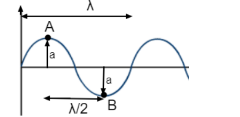Question
Question: A plane progressive wave of frequency 25 Hz, amplitude \(2.5 \times {10^{ - 5}}\)m and initial phase...
A plane progressive wave of frequency 25 Hz, amplitude 2.5×10−5m and initial phase zero moves along the negative x-direction with a velocity of 300 ms−1. A and B are two points 6 m apart on the line of propagation of the wave. At any instant the phase difference between A and B is θ. Which of the following is true if the maximum difference between the displacement of the particles at A and B is Δ?
(This question has multiple correct options)
A. θ=π B. θ=0 C. Δ=0 D. Δ=5×10−5 m
Solution
Here, we will proceed by firstly finding out the value corresponding to the wavelength of the given wave. Then, we will finally use the basic relationship between the phase difference and path difference.
Formula used:
v=νλ and θ=λ2π(Δx).
Complete answer:
Given, Frequency of wave ν=25 Hz
Amplitude of wave a = 2.5×10−5 m
Initial phase of wave = 0
Velocity of wave v = 300 ms−1
Path difference of Distance between points A and B Δx = 6 m
Phase difference between A and B = θ

As we know that the velocity of any wave is equal to the product of the frequency of the wave and the wavelength of the wave
v=νλ where v is the velocity of the wave, ν represents the frequency of the wave and λ represents the wavelength of the wave
⇒λ=νv ⇒λ=25300=12 m
The wavelength of the given wave is equal to 12 metres
Also we know that the phase difference between any two points can be written as
θ=λ2π(Δx) where θ denotes the phase difference between the points, λ represents the wavelength of the wave and Δx denotes the path difference between the points
⇒θ=122π(6)=1212π=π
So, the phase difference between the points A and B is θ=π or θ=1800
Let the two points A and B having a phase difference of π or 1800 are as shown in the figure.
The maximum difference between the displacements of particles at A and B Δ = 2(Amplitude) = 2×2.5×10−5=5×10−5 m
So, the correct answer is “Option A and D”.
Note:
Amplitude of any wave is defined as the distance between the midline and the crest or the trough of the wave. Amplitude usually signifies the amount of the energy transported by the wave. Wavelength of any wave is defined as the distance between two successive crests or troughs of the wave.
